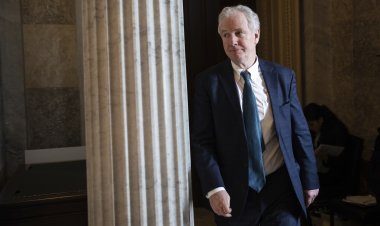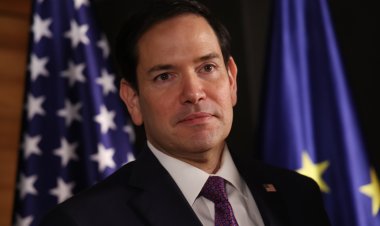Biden says he’s exploring 14th amendment to defuse debt ceiling standoff
The president said he would look at possibly invalidating the debt ceiling through the 14th amendment “months down the road.”

President Joe Biden on Tuesday said he was “considering” the use of the 14th amendment as a means to circumvent the debt ceiling standoff he currently finds himself in with House Republicans.
But he cast some doubt on whether it could work, saying it would “have to be litigated and in the meantime without an extension it’d still end up in the same place.” The president said he would look at the issue of invalidating the debt ceiling through the 14th amendment “months down the road.” The amendment states that the public debt of the United States “shall not be questioned.”
Biden also refused to rule out a short-term debt limit increase.
"I said I would come back and talk,” he said. “The one thing I’m ruling out is default, and I’m not going to pass a budget that has massive cuts.”
The president’s remarks came at the White House shortly after a meeting he called “productive” with House Speaker Kevin McCarthy and the three other top congressional leaders. But Biden leveled criticism at McCarthy for sometimes making remarks during the meeting that were “maybe a little bit over the top” and for not knowing what he had proposed in his GOP bill.
“Three of the four participants [were] very measured and low key,” Biden said.
Back at the Capitol, McCarthy laughed off the comment, saying: “If you ever spend time with [Senate Majority Leader Chuck] Schumer, you’ll find out who the fourth is.”
On a more serious note, Biden warned that not everyone at the negotiating table pledged to avoid default.
Among only “three of the five, there was substantial movement that everyone agreed that deficit — defaulting on the debt was off the table,” Biden said.
The president is scheduled to meet again Friday with McCarthy, Schumer, Senate Minority Leader Mitch McConnell and House Minority Leader Hakeem Jeffries. Until then, White House staff and aides to the four congressional leaders would continue to hold discussions, those involved said.
Biden is scheduled to leave for Japan in a week for the G-7 summit, but the president said he’d consider delaying his trip if an agreement appeared to be in reach. Underscoring the seriousness of the debt discussions, he called it “the single most important thing that’s on the agenda.”
Canceling the trip, he said, is possible, but not likely.
“In other words, if somehow we got down to the wire and we still hadn’t resolved this and the due date was in a matter of, when I was supposed to be away. I would not go. I would stay till this gets finished,” he said.
White House and congressional appropriations staff are to begin discussions on a budget, which could form the outlines of an agreement. The Biden administration has insisted that the budget talks would be separate from a debt limit increase.
Biden expressed openness to one key GOP ask: Rescinding tens of billions of dollars in Covid funding.
“The answer is, I’d take a hard look at it,” Biden said, adding that the government “didn’t need it all” but needed to determine how much of that pot has been committed to various projects. “It’s on the table.”
Still, Biden made clear that an agreement is not imminent.
“There’s a lot of politics, posturing and gamesmanship and it’s going to continue for a while, but I’m squarely focused on what matters,” he added.
Sarah Ferris and Adam Cancryn contributed to this report.












